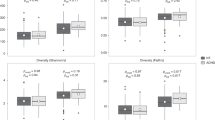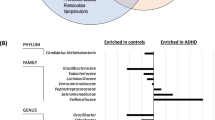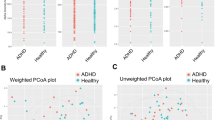Abstract
Backround
This systematic review aims to examine the associations between features of gut microbiome and Attention Deficit/Hyperactivity Disorder (ADHD) risk or severity in children, adolescents and young adults.
Methods
Eligible studies were identified in PubMed and Google Scholar databases until December 31, 2020.
Results
The search identified a total of 1197 items, of which 11 were included in this systematic review. The findings regarding alpha, beta diversity, bacterial phyla, orders and families were inconclusive. At the genus level an increased abundance of Odoribacter (two studies) and Eggerthella (two studies) was found in ADHD; on the contrary, decreased abundance of Faecalibacterium (three studies) was noted, whereas one study suggested its inverse association with ADHD severity and hyperactivity. One study indicated that Bacteroides species also correlated with levels of hyperactivity and impulsivity. At the species level, a lower abundance of Faecalibacterium prausnitzii, but higher of Odoribacter splanchnicus and Bacteroides uniformis was reported.
Conclusions
This systematic review highlights associations between gut microbiome features and ADHD. Potential mechanisms differ by microorganism and include effects on neurotransmitter production, dopamine metabolism, modulation of inflammation and neurodevelopment through the release of cytokines.
Impact
-
The existence of correlations between features of gut microbiome and ADHD manifestation or its severity in children, adolescents and young adults.
-
Associations between gut microbiome features and ADHD are highlighted. Potential mechanisms seem to differ by microorganism and include effects on neurotransmitter production, dopamine metabolism, modulation of inflammation and neurodevelopment through the release of cytokines.
-
As correlations between gut microbiome features and ADHD seem to exist, additional studies are needed for further investigation.
Similar content being viewed by others
Log in or create a free account to read this content
Gain free access to this article, as well as selected content from this journal and more on nature.com
or
References
Attention Deficit/Hyperactivity Disorder. Neurodevelopmental Disorders 59 - 66. Diagnostic and Statistical Manual of Mental Disorders. Fifth Edition. (American Psychiatric Association, Arlington, VA, USA, 2013).
Hyperkinetic Disorders. Behavioural and emotional disorders with onset usually occurring in childhood and adolescence 206 - 209. The ICD-10 Classification of Mental and Behavioural Disorders. Clinical descriptions and diagnostic guidelines. (World Health Organization).
Nieg, J. T., Sibley, M. H., Thapar, A. & Karalunas, S. L. Development of ADHD: Etiology, Heterogeneity, and Early Life Course. Annu. Rev. Dev. Psychol. 2, 559–583 (2020).
Kooij, J. J. S. et al. Updated European Consensus Statement on diagnosis and treatment of adult ADHD. Eur. Psychiatry 56, 14–34 (2019).
Ursell,L., K., Metcalf, J. L., Wegener Parfrey, L. & Knight, R. Defining the human microbiome. Nutr. Rev. 70, S38–S44 (2012).
Wang, M., Ahrne, S., Jeppsson, B. & Molin, G. Comparison of bacterial diversity along the human intestinal tract by direct cloning and sequencing of 16S rRNA genes. FEMS Microbiol. Ecol. 54, 219–231 (2005).
Whittaker, R. H. Evolution and measurement of species diversity. TAXON 21, 213–251 (1972).
D’Argenio, V. & Salvatore, F. The role of the gut microbiome in the healthy adult status. Clin. Chim. Acta 451, 97–102 (2015).
Lozupone, C. A., Stombaugh, J. I., Gordon, J. I., Jansson, J. K. & Knight, R. Diversity, stability and resilience of the human gut microbiota. Nature 489, 220–230 (2012).
Shreiner, A. B., Kao, J. Y. & Young, V. B. The gut microbiome in health and in disease. Curr. Opin. Gastroenterol. 31, 69–75 (2015).
Bercik, P., Collins, S. M. & Verdu, E. F. Microbes and the gut-brain axis. Neurogastroenterol. Motil. 24, 405–413 (2012).
Montiel-Castro, A. J., Gonzales-Cervantes, R. M., Bravo-Ruiseco, G. & Pacheco-Lopez, G. The microbiota-gut-brain-axis: neurobehavioral correlates, health and sociality. Front. Integr. Neurosci. 7, 1–16 (2013).
Garcia-Gutierrez, E., Narbad, A. & Rodríguez, J. M. Autism Spectrum Disorder Associated With Gut Microbiota at Immune, Metabolomic, and Neuroactive Level. Front. Neurosci. 14, 578666 (2020).
Ronan, V., Yeasin, R. & Claud, E. C. Childhood Development and the Microbiome-The Intestinal Microbiota in Maintenance of Health and Development of Disease During Childhood Development. Gastroenterology 160, 495–506 (2021).
Izuno, S., Yoshihara, K. & Sudo, N. Role of Gut microbiota in the pathophysiology of stress-related disorders: evidence from neuroimaging studies. Ann. Nutr. Metab. 77, 4–10 (2021).
Borghi, E. & Vignoli, A. Rett syndrome and other neurodevelopmental disorders share common changes in gut microbial community: a descriptive review. Int. J. Mol. Sci. 20, 4160 (2019).
Ligezka, A. N. et al. A systematic review of microbiome changes and impact of probiotic supplementation in children and adolescents with neuropsychiatric disorders. Prog. Neuropsychopharmacol. Biol. Psychiatry 108, 110187 (2021).
Boonchooduang, N., Louthrenoo, O., Chattipakorn, N. & Chattipakorn, S. C. Possible links between gut–microbiota and attention-deficit/hyperactivity disorders in children and adolescents. Eur. J. Nutr. 59, 3391–3403 (2020).
Kalenik, A. et al. Gut microbiota and probiotic therapy in ADHD: A review of current knowledge. Prog. Neuropsychopharmacol. Biol. Psychiatry 110, 110277 (2021).
Fan, C. et al. SCFA producing bacteria shape the subtype of ADHD in children. https://doi.org/10.21203/rs.2.16337/v1 (2019).
Li, Y. et al. Gut metagenomics discriminates unique microbial signatures in diverse symptomatic profiles with attention-deficit/hyperactivity disorder. https://doi.org/10.21203/rs-28862/v1 (2020).
Pärtty, A., Kalliomäki, M., Wacklin, P., Salminen, S. & Isolauri, E. A possible link between early probiotic intervention and the risk of neuropsychiatric disorders later in childhood: a randomized trial. Pediatr. RESEARCH 77, 823–828 (2015).
Aarts, E. et al. Gut microbiome in ADHD and its relation to neural reward anticipation. PLoS ONE 12, e0183509 (2017).
Jiang, H. et al. Gut microbiota profiles in treatment-naïve children with attention deficit hyperactivity disorder. Behav. Brain Res. 347, 408–413 (2018).
Szopinska-Tokov, J. et al. Investigating the gut microbiota composition of individuals with attention-deficit/hyperactivity disorder and association with symptoms. Microorganisms 8, 406 (2020).
Wan, L. et al. Case-control study of the effects of gut microbiota composition on neurotransmitter metabolic pathways in children with attention deficit hyperactivity disorder. Front. Neurosci. 14, 127 (2020).
Prehn-Kristensen, A. et al. Reduced microbiome alpha diversity in young patients with ADHD. PLoS ONE 13, e0200728 (2018).
Wang, L. J. et al. Gut microbiota and dietary patterns in children with attention‐deficit/hyperactivity disorder. Eur. Child Adolesc. Psychiatry 29, 287–297 (2020).
Akram, H. Characterizing a link between gut microbiome and attention deficit hyperactive disorder. Honors College Res Collect. (2017). https://digitalcommons.fiu.edu/honors-research/4 (accessed on March 2021).
Cheng, S. et al. Identifying psychiatric disorder-associated gut microbiota using microbiota-related gene set enrichment analysis. Brief. Bioinforma. 21, 1016–1022 (2020).
Quagliariello, A. et al. Gut microbiota profiling and gut–brain crosstalk in children affected by pediatric acute-onset neuropsychiatric syndrome and pediatric autoimmune neuropsychiatric disorders associated with streptococcal infections. Front. Microbiol. 9, 1–15 (2018).
Duan, C. et al. Activated Drp1-mediated mitochondrial ROS influence the gut microbiome and intestinal barrier after hemorrhagic shock. Aging 12, 1397–1416 (2020).
Bull-Larsen, S. & Mohajerim, M. H. The potential influence of the bacterial microbiome on the development and progression of ADHD. Nutrients 11, 2805 (2019).
Srikantha, P. & Mohajeri, M. H. The possible role of the microbiota-gut-brain-axis in Autism spectrum disorder. Int. J. Mol. Sci. 20, 2115 (2019).
Bundgaard-Nielsen, C. et al. Gut microbiota profiles of autism spectrum disorder and attention deficit/hyperactivity disorder: A systematic literature review. Gut Microbes 11, 1172–1187 (2020).
Volkow, N. et al. Motivation deficit in ADHD is associated with dysfunction of the dopamine reward pathway. Mol. Psychiatry 16, 1147–1154 (2011).
Rekdal, V. M., Bess, E. N., Bisanz, J. E., Turnbaugh, P. J. & Balskus, E. P. Discovery and inhibition of an interspecies gut bacterial pathway for Levodopa metabolism. Science 364, eaau6323 (2019).
Melli, L. C. F. L. et al. Intestinal microbiota and allergic diseases: A systematic review. Allergol. Immunopathol. (Madr.) 44, 177–188 (2016).
Mitchell, R. H. B. & Goldstein, B. I. Inflammation in children and adolescents with neuropsychiatric disorders: a systematic review. J. Am. Acad. Child Adolesc. Psychiatry 53, 274–296 (2014).
Evans, S. J. et al. The gut microbiome composition associates with bipolar disorder and illness severity. J. Psychiatr. Res. 87, 23–29 (2017).
Jiang, H. et al. Altered fecal microbiota composition in patients with major depressive disorder. Brain Behav. Immun. 48, 186–194 (2015).
Tillish, K. et al. Brain structure and response to emotional stimuli as related to gut microbial profiles in healthy women. Psychosom. Med. 79, 905–913 (2017).
McAlonan, G. M. et al. Mapping brain structure in attention deficit-hyperactivity disorder: A voxel-based MRI study of regional grey and white matter volume. Psychiatry Res.: Neuroimaging 154, 171–180 (2007).
Qiu, M. et al. Changes of brain structure and function in ADHD children. Brain Topogr. 24, 243–252 (2010).
Hiergeist, A., Gessner, J. & Gessner, A. Current limitations for the assessment of the role of the gut microbiome for attention deficit hyperactivity disorder (ADHD). Front Psychiatry 11, 623 (2020).
Author contibutions
Substantial contributions to conception and design, acquisition of data, or analysis and interpretation of data; D.G., K.M., G.T., E.P., T.P. Drafting the article or revising it critically for important intellectual content; D.G., K.M., G.T., E.P. and L.T. Final approval of the version to be published: M.T., T.N.S., and A.T.
Author information
Authors and Affiliations
Corresponding author
Ethics declarations
Competing interests
The authors declare no competing interests.
Additional information
Publisher’s note Springer Nature remains neutral with regard to jurisdictional claims in published maps and institutional affiliations.
Supplementary information
Rights and permissions
About this article
Cite this article
Gkougka, D., Mitropoulos, K., Tzanakaki, G. et al. Gut microbiome and attention deficit/hyperactivity disorder: a systematic review. Pediatr Res 92, 1507–1519 (2022). https://doi.org/10.1038/s41390-022-02027-6
Received:
Revised:
Accepted:
Published:
Version of record:
Issue date:
DOI: https://doi.org/10.1038/s41390-022-02027-6
This article is cited by
-
Harnessing the microbiota-gut–brain axis to prevent and treat pediatric neurodevelopmental disorders: translational insights and strategies
Journal of Translational Medicine (2025)
-
The endocannabinoidome–gut microbiome–brain axis as a novel therapeutic target for autism spectrum disorder
Journal of Biomedical Science (2025)
-
Impact of psychostimulants on microbiota and short-chain fatty acids alterations in children with attention-deficit/hyperactivity disorder
Scientific Reports (2025)
-
Association between attention-deficit/hyperactivity disorders and intestinal disorders: A systematic review and Meta-analysis
Scientific Reports (2025)
-
Impulsivity among healthy adults is associated with diet and fecal microbiota composition
Translational Psychiatry (2025)



